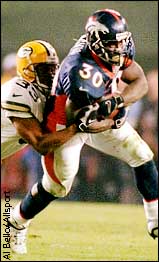 |
|
| | Tuesday, September 7 | |||||
ESPN.com | ||||||
| The memory lingers, even after consecutive Super Bowl victories for the Denver Broncos. It really wasn't that long ago when you didn't need to know who was playing in the big game, all you had to know was that the Super Bowl matched the NFC against the AFC ... because the NFC was going to win.
Beginning with Super Bowl XIX in 1985, the NFC captured 13 consecutive Super Bowls.
And it wasn't luck. Well, maybe a little luck. But when you reflect back over the last 15 years (pre-Broncos), how many great NFC teams can you think of? At least five, right: the Bears, the 49ers, the Redskins, the Cowboys and the Giants. Now, how many great AFC teams can you recall? Maybe one: the Buffalo Bills. Once you get past the Bills, you find a series of good teams who served as little more than fodder for the NFC juggernaut in the Super Bowl. But was the NFC really superior in those years, or were the NFC's best teams simply superior to the AFC's best teams? Before we get to around to answering that question, let's look at the prior history of the NFC vs. the AFC in the regular season. The AFL and NFL merged in 1970 and, Super Bowls aside, for a couple of years the NFC was clearly the superior league. In 1970 and '71 combined, the NFC won 50 of its 80 matchups against the AFC, losing 27 and tying three. But in '72 and '73, the AFC pulled even, going 39-38-3 in the two seasons. And then in 1974, the AFC took over, both in the regular season and in January. From 1974 through 1980, the AFC won six of seven Super Bowls and destroyed the NFC in the regular season. The AFC won the season series in each of those seven seasons, and overall they went 181-111 against the NFC, for a .635 winning percentage. Then came parity -- in the regular season if not the Super Bowl. In 1981-1987, both conferences recorded 167 victories in interconference games (along with two ties). However, the NFC won six of the seven Super Bowls contested after those seasons. So over this stretch, there was no apparent link between the regular season and late January. The AFC took 30 of 52 interconference games in 1988, but beginning in 1989, the NFC gained a measure of revenge for the drubbing it received in the mid-to-late 1970s. Over a seven-season stretch, the NFC won 55 percent of the interconference games, and took six of seven season series. Coincidentally or not, the NFC also won all seven Super Bowls those seasons. But over the last three years, the two conferences have been equal again. The AFC (read: the Broncos) have won two of the last three Super Bowls, but both of those games were competitive. From 1996 through '98, the AFC won 90 inter-conference games, lost 89, and tied one. That single tie -- Eagles 10, Colts 10 -- came on Nov. 16, 1997. And if Chris Boniol had converted a 40-yard field goal as time expired in overtime, the ledger would read AFC 90, NFC 90. So it would seem that we've returned to a rough level of parity between the conferences, and we might expect to see competitive Super Bowls that live up to their name. And that's good for everybody. | ALSO SEE Oates: Taking a power trip
Malone: Ten things to watch in '99
Murphy: How the cookie crumbles
 | |||||

